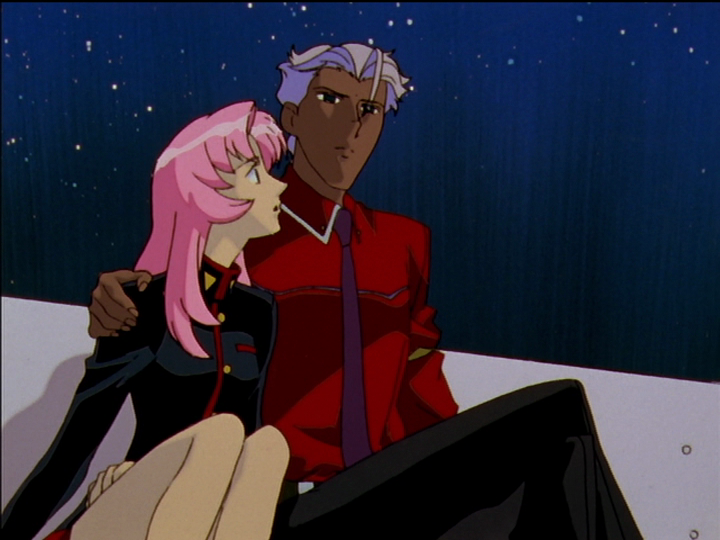

During the Black Rose. <- Previous • Next -> The three candles of episode 30.
At the start of the Apocalypse Saga, episode 25, Akio has decided that Utena must be brought under his control. He wants to manipulate her into a sexual relationship and make her submissive and girlish (suppressing her boyishness and princeliness) so that he can (pretend to) marry her and take final control over her. He moves Utena (with Anthy) into his tower room to bring her into action range. For Anthy’s point of view, see Anthy and Utena - Apocalypse Saga - episode 25.
Immediately before this, Juri looks up to the sky and wonders, “Who is End of the World?” Here, Akio explains to Utena who he is, pointing to Venus in the fake planetarium sky.
He gets right down to it. At the start of the episode the two girls are moving in. That evening, Akio and Utena are looking at planetarium stars together as they often did in the Black Rose arc. On pretense of pointing Utena toward his namesake, the morning star, he puts an arm around her and draws her close. Utena says it’s romantic as she blushes and looks straight ahead, seeing nothing of the planetarium sky. As he explains the connection with Lucifer, declaring his own evil, Utena looks at up him in fascination, oblivious to his meaning. She does not once look at the sky. Her teeth show much of the time: At the moment, she already sees Akio as her prince. And yet Utena places both hands away from him. I take it that she is overawed and does not dare approach him, but lets him do as he will. Anthy sees it differently, though.
Akio knew she would not understand. Anything he said would have sounded impressive to Utena. Well, by involving himself he draws that much more of her attention. I think he chose the story out of the sheer fiendishness of boasting of his evil while twisting her around his little finger or maybe his ring finger.
Akio demonstrates that he has knowledge of good and evil, meaning that he has tasted Eve’s apple. He wears a red shirt for the red of the apple.
Venus is Aphrodite’s planet. That is presumably why the planet is associated with women and love. Aphrodite is about love, lust, and sex. I suspect that Akio named himself after the planet to symbolically take ownership of it. He wants to own all women, and control them through love, lust, and sex.
And that’s it. Akio planted a seed, and takes little action to water it until episode 30. This approach-withdrawal maneuver is a psychological trick: He planted interest in Utena and then moved away from her, creating tension. It works because he has nearly irresistible sex appeal. The tension will keep Utena thinking about Akio, so that the interest stays alive. When he approaches again later, the latent interest will sprout suddenly because it has been quietly fertilized during the time of tension. The trick helps fool Utena into believing that the decisions he makes for her were her own choices. Akio repeats approach-withdrawal maneuvers in the First and Second Seductions and on other occasions.
It’s similar to “playing hard to get,” traditionally attributed to women. Akio relies on his overwhelming sex appeal, which makes the step of planting interest easy for him. It’s a reversal: Playing hard to get relies on the sexist assumption that men seek women, and the woman can only accept or refuse. Later in the series when Akio talks about Utena making a decision, that’s what he means.
In episode 26, he tells Utena “we’re practically family.” He’s appealing to lonely orphan Utena with the idea of belonging to a family, and at the same time subtly suggesting his evil nature. To technically become a family, they’d have to marry, rejecting Kanae; he wants that idea in Utena’s mind. Later, in episode 30 when Utena is corrupted, it will increase her temptation to kiss Akio, and remind her that she is betraying Kanae in doing so, contributing to her corruption. By the time of the Second Seduction, he would like Utena to hope that she has supplanted Kanae in Akio’s feelings, and that he will marry Utena instead. He’s preparing for that, too.
Akio also drops the “practically family” line on Nanami, when she has realized that her family is not what she thought it was. In episode 30, he calls Mrs. Ohtori “mother” as if he were already married to Kanae and part of the family. Akio reuses his scripts.
To Akio, family means somebody like Anthy: A person he has close control over. For more, see taking Ohtori - families in general.
Jay Scott <jay@satirist.org>
first posted 29 November 2021
updated 4 February 2025